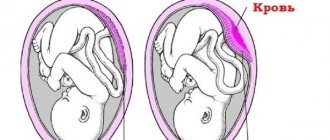The conception of a child begins with the fusion of two germ cells, male and female, which carry genetic information. This fusion is called fertilization and is a complex process that is studied by doctors and scientists. After fusion, a fertilized cell is formed - a zygote. This is the initial stage of pregnancy, during which the fertilized cell divides, turns into an embryo and further forms the fetus.
What is the process of conception?
Before a child is conceived in the mother’s body, a full-fledged egg must mature in the woman’s ovaries. This process takes about two weeks and ends with ovulation. After the follicle ruptures, the mature female reproductive cell, which has a round shape and resembles the yolk of an egg in appearance, is captured by the fallopian tube.
The egg itself cannot move; the villi of the fallopian tube help it move. At the same time, sperm move towards them, the path of which runs from the woman’s genital tract through the uterus into the fallopian tubes. If the “meeting” occurs under favorable circumstances, a child is conceived. This becomes possible when the following factors coincide:
- By the time the sperm enters the fallopian tube, the egg remains viable. The lifespan of a female reproductive cell is 12–24 hours (it is for this reason that the most favorable days for conceiving a child are the period of ovulation).
- The sperm must “get” to the egg. Given their tiny size, they have to cover a huge distance in a very short time. And among the sperm, not all of them move in the correct way (forward), have a sufficient life expectancy and are able to penetrate the egg (conceive a child).
- The sperm, having reached the egg, binds to its shell using special receptors. After this, a special bubble in the head of the sperm (acrosome) bursts, which dissolves the shell of the egg and penetrates inside. However, many sperm do not recognize the egg, and this reaction does not occur. And in some sperm, on the contrary, this reaction occurs spontaneously, before meeting the egg.
- After the fusion of sperm and egg, a zygote is formed and the first cell division occurs, which takes from 6 to 12 hours. Further division leads to the growth of the zygote and its increase in size.
- The fetus slowly moves along the fallopian tube to the uterus and, in the absence of obstacles, reaches its target and is implanted into the loosened and prepared wall of the uterus.
However, even when conception occurs, pregnancy does not always occur. In the case of adhesions, an ectopic pregnancy may occur (the zygote will not be able to reach the uterus); in the case of late ovulation, the future fetus will not be able to attach to the mucous membrane, which has already undergone changes and prepared for menstruation, or due to disturbed hormonal balance, the endometrium is not adapted to the attachment of the egg . As you can see, not only successful fertilization is important for conceiving a child and achieving pregnancy.
What affects the gender of a child?
The most interesting thing is that even today, with access to the information space, there are men who blame women for having children of a certain gender?! After all, even from a school anatomy course it is clear that the gender of the future child depends ONLY on the man.
Let us recall that men and women have 23 pairs of chromosomes, in women they are all the same (XX), in men the exception is the sex chromosome (X Y). Who will be born, a boy or a girl, is determined by which sperm will merge with the egg: with the X chromosome (X+X) a female fetus will appear, with the Y chromosome (X+Y) a male fetus. An interesting fact here is that sperm with an X chromosome travel much more slowly through the reproductive tract to meet the egg than sperm with a Y chromosome.
The method of planning the baby's gender is based on these physiological characteristics. If there was sexual intercourse on the first day after ovulation, then there is a high probability of a boy; if later, then a girl.
Planning your pregnancy
Gynecologists and obstetricians strongly recommend that future parents plan for the birth of a child and undergo appropriate preparation. The main problem that needs to be given maximum attention is to check the health status of both partners. If such an examination reveals diseases, they should be treated and waited for about 3 months, otherwise the diseases or medications taken may become an obstacle to conceiving children. This is especially true for sexually transmitted diseases. An examination by specialists should be carried out in advance, and not after unsuccessful attempts to get pregnant, this will save time and save you from stress.
Video
Opinion of Yuri Nikolaevich Zharkov, sexologist, current member of the World Sexological Association.
Opinion of Elena Petrovna Berezovskaya - doctor-researcher, obstetrician-gynecologist, founder and head of the International Academy of Healthy Life
On this positive note, I would like to remind future parents that they should not be upset if the result of the calculations was incorrect and a child of the opposite sex was born. The most important thing in the current environment is that he is born HEALTHY!!!
How to properly prepare for conceiving a child?
Compliance with certain rules of preparation for future pregnancy is required from both parents. These include:
- Both parents should visit a therapist and talk about the planned conception, and then receive directions for general and biochemical blood tests. This is required to assess the general condition of the parents and treat diseases, if any.
- Also, before conceiving a child, you need to make sure that the parents do not have sexually transmitted diseases, genital tract infections, microplasmosis, HIV and hepatitis C.
- Parents should give up bad habits, including drinking beer, cigarettes, and foods with preservatives.
- A woman should also visit a gynecologist and have her reproductive system examined.
- A man should take drugs to increase fertility (improving sperm quality), and a woman should take vitamin and mineral complexes to prepare for pregnancy.
Conception by blood renewal
Conceiving a girl is 100 percent possible using this method. The method is based on determining the date of blood renewal. The younger the blood, the more likely it is to be a priority. So, for example, if a potential mother has younger blood than a potential father, then there is a high chance of having a female child. And, accordingly, vice versa.
In women, blood is renewed once every 3 years, in men - once every 4 years.
Calculation example
For example, a couple is planning to conceive a child in 2021 and is expecting a girl. The father's date of birth is January 20, 1990, the mother's date of birth is June 24, 1992. A man’s blood is renewed once every 4 years, therefore, his last update occurred in 2018, and the next update is expected in January 2022.
The woman was last updated in June 2021, so her blood is younger. Such a couple has a high probability of conceiving a girl in 2021.
When calculating in this way, facts of blood loss (surgeries, childbirth, injuries) should be taken into account. Any major blood loss gives a new start to the countdown of blood renewal. That is, the calculation should be made not on the basis of the birthday, but on the basis of the last major blood loss.
There is another calculation method based on the Rh factor and blood type of the parents:
- the same Rh factor between parents increases the chances of having a girl;
- various Rh factors contribute to the conception of a boy;
- when parents have the first or second blood group, regardless of rhesus, most likely a boy will be born.
Table of the relationship between the blood type of the parents and the gender of the unborn child:
| Blood type | Father | |||
| Mother | I | II | III | IV |
| I | D | M | D | M |
| II | M | D | M | D |
| III | D | M | M | D |
| IV | M | D | M | D |
How to choose the best day to conceive a child?
Many young couples believe that pregnancy should occur in the first month with unprotected regular sex. In fact, even if the future parents are completely healthy, pregnancy can occur after 3-4 months and even after six months or a year, this is not a deviation from the norm. You can speed up the appearance of children in a family by determining the appropriate day of the menstrual cycle (by calculating ovulation for conceiving a child).
This period is called the “fertility window” and lasts on average 6 days. At this time, ovulation occurs, and a full-fledged egg is ready to merge with a sperm. You can calculate your ovulation schedule using an ovulation calculator or by measuring your basal temperature.
It is the period of ovulation that is the best time to plan a child. With unprotected sex, there is a high probability of fertilization and pregnancy.
Keeping a calendar to determine ovulation and calculate the favorable time for conceiving a child
The egg retains the ability to fertilize for only 2 days, so for pregnancy to occur, sexual intercourse must take place during this period. In order to accurately calculate the favorable time period for conceiving a child, a girl must keep a calendar to track her cycle.
It is necessary to mark your period on the calendar from the first day until the end of the discharge. A favorable period for fertilization of an egg can be determined by monitoring the cycle for three to five months.
After you set the cycle duration, you can use an ovulation calculator or calculate the cycle phases yourself:
- Follicular phase - from the first day of menstruation. The stage of growth of the egg and the follicle in which it is located begins. The duration of the period is from 11 to 21 days.
- Ovulation - during this period of time the content of luteinizing hormone increases, as a result of which the egg is released from the ovary. Ovulation lasts up to 48 hours.
- The luteal phase lasts from the end of ovulation until the next menstrual cycle.
Important: The highest chance of conceiving is in the middle of the cycle. The first day of menstruation is the beginning, the onset of the next menstruation is the end.
Is position important during conception?
This question remains open. Some argue that a couple should have sex in the missionary position, while other women believe that the position when the partner is from behind is also suitable for successful conception of a child. There is also disagreement about how “turbulent” intimacy can be. Female orgasm leads to contraction of the vaginal muscles, which promotes the rapid movement of sperm. But scientists have not found evidence that the position and intensity of sex affects the likelihood of conception.
The right choice of positions as a way to conceive a girl
Conceiving a girl is also possible if you use certain positions, and this technique is widespread; many are confident that it gives a 100 percent successful result. Since sperm with the Y type of chromosomes, although fast, are weak and easily vulnerable, and therefore the likelihood that they will reach the egg and fertilize it is very low.
Therefore, to conceive a girl, it is recommended to choose positions of shallow penetration, which will make it possible to gain time for the X chromosomes. The greater the distance and time to reach the goal for the Y chromosomes, the higher the chances of the X chromosomes to fertilize the egg.
The most suitable positions for conceiving a girl are:
- missionary (man on top between woman's spread legs);
- on the side (the man is behind the woman);
- the woman lies on her stomach, slightly raising her buttocks, and the man is behind;
- the man lies on his back and the woman on top, and the position is possible both face to face and vice versa.
When having sex and using these positions, you need to ensure that the penetration is shallow. This will allow the seminal fluid to linger and not reach the egg ahead of time.
Also, many experts are convinced that orgasm is of great importance in determining the gender of the unborn child. If it is absent, then the chances of conceiving a girl increase; if, on the contrary, a woman experienced an orgasm during sexual intercourse, it is worth expecting a boy.
On what day can signs of pregnancy appear?
In most cases, a woman finds out about pregnancy by a delay in menstruation, which does not come on time. After the first day of delay, a woman’s new position can already be confirmed by conventional home pregnancy tests in the form of test strips.
However, in certain cases, it is possible to detect precursors that are observed after 5-7 days when children are conceived. This is the appearance of spotting or traces of blood on underwear.
This happens towards the end of the cycle, but even before the start of the expected menstruation and indicates the implantation of the embryo into the uterine cavity, accompanied by implantation bleeding. Implantation of the fertilized egg indicates pregnancy. At this stage, test strips may not show pregnancy, but an ultrasound and blood test will already confirm its occurrence. Therefore, if you want to quickly find out the good news, visit a gynecologist.
Later signs of pregnancy are symptoms of early toxicosis, for example, nausea in the morning. Also, in the early stages of pregnancy, appetite may suddenly disappear or, conversely, increase sharply. Increased sensitivity to odors may occur.
Active development of the embryo leads to growth of the uterus and enlargement of the abdomen for a period of about 4 months. Until then, the abdominal enlargement may not be noticeable.
Luteal phase
The luteal phase (corpus luteum phase) begins from the moment of ovulation and lasts about 12-16 days.
In place of the ovulated follicle, a corpus luteum forms within a few days after ovulation. Its main function is the synthesis of progesterone and estrogens to maintain future pregnancy. If pregnancy does not occur, then after 10-12 days the corpus luteum undergoes reverse development, which leads to a drop in hormone levels, after which the next menstruation begins. If pregnancy has occurred, the corpus luteum continues to function and support the pregnancy.
In the absence of pregnancy, progesterone levels reach their maximum value about a week after ovulation - at this time it is recommended to take a blood test for progesterone to assess the function of the corpus luteum.
What to do if you can't get pregnant?
According to observations, about 13% of couples who do not have serious health problems dream of children, but the woman is unable to get pregnant. A couple can be considered infertile if they have been sexually active for one or more years without using contraception, but the woman does not become pregnant. If you cannot get pregnant for a long time, future parents should undergo examination. It is important that the man also visit the doctor and get tested, since problems in the reproductive system can occur not only in the expectant mother, but also in the future father. The purpose of the examination is to identify the cause of infertility. And after that, of course, do everything possible to ensure pregnancy occurs.
- Disturbances in the male reproductive system can be different - from varicocele or infectious diseases to deterioration in sperm quality for an unknown reason. A man does not always require surgical treatment or hormones. For example, in the case of inflammatory processes, the doctor will prescribe antibacterial drugs. And in the case of an insufficient number of sperm capable of fertilization, you may need to take Speroton, a drug that has proven effective in this situation.
- Disturbances in the functioning of the female reproductive system are also of a different nature: from hormonal problems to stress. Conceiving a child can be prevented by high levels of prolactin, or lack of ovulation, obstruction of the fallopian tubes, thin endometrium, various inflammatory processes, etc. A woman's treatment for infertility is selected depending on the cause. In particular, women with reduced fertility due to insufficient endometrial thickness, irregular cycles or high prolactin levels can be prescribed a Pregnoton complex with vitamins, minerals, amino acids and vitex extract.
- Male and female factors of infertility are simultaneously detected in approximately 20% of infertile couples. Moreover, the reason may be precisely in the partnership - for example, immunological incompatibility or a mismatch in the combination of genes of the future parents. Or it may be that fertility is reduced in each of the parents, which ultimately reduces the likelihood of conception to almost zero. It is important to note that often the cause of non-pregnancy is sexually transmitted diseases, which are asymptomatic in both partners. In this case, it is enough for the future parents to undergo a course of treatment.
- Idiopathic infertility is a situation when examinations show no abnormalities in either a man or a woman, and conception does not occur.
The main thing is to remember that today medicine can solve many problems that cause infertility. And specialists will certainly select the most effective one for your case. Modern reproductive specialists have a variety of remedies in their arsenal - from proven vitamin and mineral complexes to assisted reproductive technologies (ART).
THIS IS NOT AN ADVERTISING. THE MATERIAL WAS PREPARED WITH THE PARTICIPATION OF EXPERTS.
Is it possible to conceive a girl while following a strict diet?
This method is not a priority and does not give a 100% result in conceiving a girl, but it is believed that following a certain diet increases the chances. The diet allows you to enrich a woman’s body with nutrients and vitamins, thereby creating an acidic environment.
Even if nutrition does not 100% increase the likelihood of conceiving a girl, it will, however, increase a woman’s chances of bearing and giving birth to a healthy baby. It is recommended not only for women, but also for men to adjust their diet 3-4 months before planning pregnancy. Proper nutrition is believed to improve sperm quality.
General dietary recommendations are as follows:
- limit consumption of sugar, salt, potatoes, meat;
- increase the amount of foods rich in magnesium and calcium (substances found in carrots, beets, onions, cucumbers and many other vegetables);
- frequently consume milk and dairy products, fish, eggs, seafood, fresh fruits with the exception of peaches and bananas;
- exclude from the diet any fast food, smoked, salty, spicy foods.
Medical experts suggest that following the French diet increases the chance of having a girl. This theory is justified by the fact that a woman’s body takes in a large amount of proteins, which in turn increases the production of the female hormone estrogen.
Character of the child by date of conception
The fate of a child is influenced not only by the day of his birth, but also by the date of conception. It is not for nothing that in some countries the birthday is celebrated on the day the baby was conceived. The right time for conception will reward the child with the desired qualities and abilities and help him achieve success in life.
Since ancient times, people have believed that the location of the heavenly bodies has a direct connection with events occurring on Earth and has a direct impact on the physical and emotional state of people.
At the moment of conception and birth of a child, the Sun, Moon, planets and stars influence the formation of his individual characteristics, character traits, talents and subsequent life path. Modern astrological horoscopes support this ancient knowledge.
To reward a child with certain qualities, you need to know in what month and date of the Star favor these qualities.
Days of conception in January
Children conceived at the beginning of the month have a strong character and a penchant for managerial and organizational activities. Cons: hot temper, which will complicate relationships with loved ones.
Conception at the end of the month will lead to the birth of a calm, peaceful child who will easily resolve any conflict in adulthood.
The problem may be excessive softness, which others will abuse.
The most favorable days: January 7, 9, 14 and 30. Conceiving children at this time reduces the manifestation of negative qualities to a minimum. Unfavorable days: January 21 and 25.
Days of conception in February
A child conceived at the beginning of the month will definitely win the favor of other people. Such children are easy-going and open, but not expressive. However, from excessive expenditure of energy they can become tired, withdraw into themselves, or even experience a nervous breakdown.
The main feature of children conceived under the auspices of Pisces is instability of character: uncertainty of desires and painful search for oneself.
But they adapt well to new circumstances and are capable of performing any task remarkably well if it is of interest.
Favorable days for conception: February 2, 11, 19, 23, 26 and 28. Unfavorable days: February 6, 20 and 25.
Days of conception in March
Conceiving children at the beginning of the month will give them energy and sociability. They grow up to be stress-resistant and achieve success in all areas related to communicating with people. At the end of the month, the Stars also favor these qualities, but there is a risk of “side effects”: excessive assertiveness and an overwhelming effect on others.
Favorable days: March 1, 6, 21 and 30. Unfavorable days: March 18 and 27.
Days of conception in April
The first period is suitable for the conception of purposeful and persistent people. The main thing is that the desire for a goal does not degenerate into ambition and a willingness to go over your head to achieve it. Children conceived at the end of the month are distinguished by strong stubbornness and self-will, but at the same time they achieve great heights in life and occupy high leadership positions.
Favorable days: April 22, 25 and 29. Unfavorable days: April 16 and 20.
Days of conception in May
Children conceived under the sign of Taurus are very expressive and hot-tempered. As a rule, they are gifted with charm and artistic abilities.
They can easily prove themselves both in the field of art and in unrelated professions. The level of expression decreases significantly by the end of May.
Emotional balance does not deprive them of artistic abilities, but to develop them, the child may need outside help.
Favorable days: May 4, 16, 17, 28 Unfavorable days: May 2 and 5
Days of conception in June
Children who were conceived in the first half of June are distinguished by a high degree of concentration and the ability to focus even on what seems uninteresting, therefore they can achieve success in almost any professional field. After the Sun moves into the sign of Cancer, perseverance and concentration are added to a tendency towards pragmatism. To “stir up” such children, you need to give them as many emotions as possible.
Favorable days: June 3, 6, 17, 22, 26 Unfavorable days: June 4 and 25
Days of conception in July
Conceiving children in July days can introduce a certain amount of phlegmatism and sluggishness into their temperament. But such children, as a rule, are neat and efficient.
They can even do scrupulous work that requires great concentration.
Children who were decided to have after July 23 have a much wider emotional spectrum, but they have to make a lot of effort to concentrate on any task.
Favorable days: 4, 5, 12, 24 and 27 July Unfavorable days: 7, 16, 25 July
Days of conception in August
The emotional range of babies conceived under the sign of Leo is so wide that it can degenerate into hot temper. They are distinguished by painful pride and react very violently to any manifestation of criticism. They have very original thinking. After August 22, hot temper and aggravated reactions to irritants are smoothed out, because these children have much more developed patience.
Favorable days: August 1, 18, 23 Unfavorable days: August 4, 8, 20
Conception days in September
Heightened intuition is a striking feature of children conceived at this time. They easily predict the course of events and feel the emotions of other people very well. It is easy and comfortable for others to be around them.
Minus: such people experience other people's pain as their own, and this takes a lot of strength and energy from them.
The sun appears in Libra on September 24, and this period is favorable for conceiving a calm child who can easily put his thoughts in order and bring harmony to the family.
Favorable days: 7, 8, 21, 24 September Unfavorable days: 9, 20 and 30 September
Conception days in October
Children conceived in the first two-thirds of the month are distinguished by their hard work, the ability to calculate the situation several steps ahead and have a good understanding of people. This last quality can sometimes lead to suspicion.
Distrust towards people is fully manifested in those children who were conceived under the Sign of Scorpio.
But at the same time, such children have highly developed critical thinking and the ability for deep analysis, and therefore they are able to achieve high success in science.
Favorable days: October 15, 23, 27, 30 Unfavorable days: October 24 and 26
Conception days in November
A tendency to introspection, a desire to analyze and understand the world around us distinguishes children who were influenced by November Scorpio. As a rule, they have artistic talent. This trait also persists in those who were conceived after November 22, but it is difficult for such children to express themselves independently - they need a guiding hand that will help them open up.
Favorable days: November 3, 16, 18, 22, 29 Unfavorable days: November 17 and 19
To the doctor - together!
The spouse is most often invited to the antenatal clinic. You have to go there together, just as you once went to the registry office. The gynecologist, of course, will tell you how to calculate the most favorable days for conceiving a baby. But before that, they will collect an anamnesis ( anamnesis is a set of information obtained during a medical examination by questioning the person being examined and/or people who know him. The study of anamnesis, like questioning in general, is not just a list of questions and answers to them. From the style of conversation between the doctor and the patient depends on the psychological compatibility, which largely determines the ultimate goal - alleviation of the patient’s condition) - they find out when and what both spouses were sick with. After conducting the necessary research, they will make recommendations.
Doctors believe that it takes six months to prepare for conception. Within half a year, a woman’s body must become stronger in order to bear a healthy child. The man’s body, strange as it may seem, also needs preparation.
READ ALSO: List of tests (for women and men) when planning pregnancy
Vitaminization comes first!
Even if the couple is healthy, the man and woman will be prescribed vitamins. And both are the same. Folic acid, vitamins A, E, C; They will prescribe zinc and selenium.
You may ask: why?
The same general strengthening drugs act on the male and female bodies differently.
- Folic acid, which is called the “pregnancy vitamin”. In women before conception, it promotes the maturation of eggs. In men - high-quality sperm. However, the woman will take this vitamin until the end of pregnancy. A man can stop with the successful onset of conception.
- Vitamin A in men stimulates sexual desire and improves sperm quality. An unborn child needs vitamin A for his eyes. But usually doctors do not allow exceeding its dosage.
- “Women’s vitamin” E, which is called the vitamin of youth and beauty, takes care of the skin, bones, and nails. In men, it promotes sperm maturation.
- Vitamin C is a good immune stimulant. It will protect sperm from free radicals. It is also important for women.
- Selenium promotes the production of sperm and prolongs their lifespan, preventing them from dying prematurely.
- Zinc also increases sperm viability. This means it is useful for men for full conception.
- B vitamins are more often prescribed to women on the eve of conception: B6 - promotes the proper formation of the cerebral cortex in the unborn baby. The body of the expectant mother should be saturated with it. In addition, in combination with B12 and B1, it has a positive effect on the cardiovascular and musculoskeletal system of the developing fetus. There should be enough of these vitamins in the body of the expectant mother even before conception.
- Vitamin D is beneficial for both mother and child. It is necessary for the formation of healthy teeth in the baby. And to protect the teeth of a mother who is carrying a child under her heart.
When the future parents are stronger, physically and mentally prepared for the arrival of a small family member, they can begin to calculate the correct day of conception of their first child.
READ ALSO: 10 important things that you definitely need to do before pregnancy
Main signs of ovulation
In some cases, women have irregular cycles and find it more difficult to determine the right days to conceive. Then you need to know other signs indicating the onset of ovulation.
Cervical changes
If cervical mucus is similar to egg whites in consistency and appearance, then ovulation is either occurring or approaching. This fluid may look different for every woman, but ovulation is usually the day with the most viscous fluid.
Change in body temperature
Most women experience a constant basal body temperature (BBT) throughout the menstrual cycle. It may decrease slightly the day before ovulation, but the most important change is the significant increase in BBT that begins the day after ovulation and continues. To determine favorable days for conception, you need to measure your temperature regularly and keep a chart for at least 3 menstrual cycles.
Firmness of the cervix or changes in its position
During ovulation, the cervix undergoes many changes. You may notice that it is wet, open, soft, or raised. It is necessary to pay attention to examining the cervix over several cycles in order to be able to distinguish its condition during ovulation and other days.
Secondary signs
Secondary signs do not necessarily occur in all women, but can also help determine favorable days for conception. Some symptoms include increased sex drive, bloating, breast tenderness, mild pain or cramping in the pelvic area, and increased perception of taste or smell.
Use tests to determine ovulation
You can buy ovulation tests at a pharmacy or store. They will be able to warn about its occurrence 12-24 hours in advance. The principle of operation is based on measuring the level of luteinizing hormone (LH), the amount of which reaches its peak just before the onset of ovulation. You just need urine for a test to determine when you are ovulating. This is not the best way to determine the best days to conceive, since it works at the very end of the fertile window, but it is quick and simple.
(
3 ratings, average: 3.00 out of 5)











